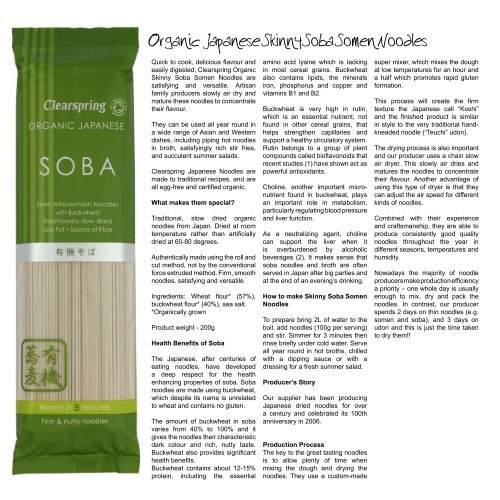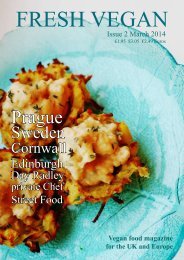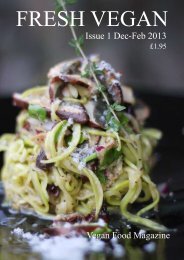FRESH VEGAN Issue 4
Issue 4 Would seem our biggest issue yet! Seeing food from Japan with original Japanese recipes and Chefs from all over our Planet creating their version of Japanese Sushi from Montreal, New York, Japan and London. Interviewing possibly one of my personal favourite companies Clearspring, sharing their unique knowledge on Noodles, our Editor Jacqui interviews them and they share a unique recipe. Mayumi Nishimura traditional Macrobiotic Chef shows us how to make traditional Japanese dumplings as well as sharing recipes from her book and even a competition to own one of her books. Luke Berman shows us what to eat In Kenya and Emily interviews the author Shushana Castle from Rethink Food which Features over 100 doctors, 8 renowned nutritionists, and 8 elite athletes from around the world, covering the benefits of a plant based diet and the diseases associated with eating animal products. Vicki Cosio, Veganuary, Vegan Mashup TV, Day Radley with the best Raw food restaurant to eat in whilst in London are amongst others featured in this issue 4.
Issue 4 Would seem our biggest issue yet! Seeing food from Japan with original Japanese recipes and Chefs from all over our Planet creating their version of Japanese Sushi from Montreal, New York, Japan and London.
Interviewing possibly one of my personal favourite companies Clearspring, sharing their unique knowledge on Noodles, our Editor Jacqui interviews them and they share a unique recipe.
Mayumi Nishimura traditional Macrobiotic Chef shows us how to make traditional Japanese dumplings as well as sharing recipes from her book and even a competition to own one of her books.
Luke Berman shows us what to eat In Kenya and Emily interviews the author Shushana Castle from Rethink Food which Features over 100 doctors, 8 renowned nutritionists, and 8 elite athletes from around the world, covering the benefits of a plant based diet and the diseases associated with eating animal products.
Vicki Cosio, Veganuary, Vegan Mashup TV, Day Radley with the best Raw food restaurant to eat in whilst in London are amongst others featured in this issue 4.
You also want an ePaper? Increase the reach of your titles
YUMPU automatically turns print PDFs into web optimized ePapers that Google loves.
Organic Japanese Skinny Soba Somen Noodles<br />
48<br />
Quick to cook, delicious flavour and<br />
easily digested, Clearspring Organic<br />
Skinny Soba Somen Noodles are<br />
satisfying and versatile. Artisan<br />
family producers slowly air dry and<br />
mature these noodles to concentrate<br />
their flavour.<br />
They can be used all year round in<br />
a wide range of Asian and Western<br />
dishes, including piping hot noodles<br />
in broth, satisfyingly rich stir fries,<br />
and succulent summer salads.<br />
Clearspring Japanese Noodles are<br />
made to traditional recipes, and are<br />
all egg-free and certified organic.<br />
What makes them special?<br />
Traditional, slow dried organic<br />
noodles from Japan. Dried at room<br />
temperature rather than artificially<br />
dried at 60-80 degrees.<br />
Authentically made using the roll and<br />
cut method, not by the conventional<br />
force extruded method. Firm, smooth<br />
noodles, satisfying and versatile<br />
Ingredients: Wheat flour* (57%),<br />
buckwheat flour* (40%), sea salt.<br />
*Organically grown<br />
Product weight - 200g<br />
Health Benefits of Soba<br />
The Japanese, after centuries of<br />
eating noodles, have developed<br />
a deep respect for the health<br />
enhancing properties of soba. Soba<br />
noodles are made using buckwheat,<br />
which despite its name is unrelated<br />
to wheat and contains no gluten.<br />
The amount of buckwheat in soba<br />
varies from 40% to 100% and it<br />
gives the noodles their characteristic<br />
dark colour and rich, nutty taste.<br />
Buckwheat also provides significant<br />
health benefits.<br />
Buckwheat contains about 12-15%<br />
protein, including the essential<br />
amino acid lysine which is lacking<br />
in most cereal grains. Buckwheat<br />
also contains lipids, the minerals<br />
iron, phosphorus and copper and<br />
vitamins B1 and B2.<br />
Buckwheat is very high in rutin,<br />
which is an essential nutrient, not<br />
found in other cereal grains, that<br />
helps strengthen capillaries and<br />
support a healthy circulatory system.<br />
Rutin belongs to a group of plant<br />
compounds called bioflavonoids that<br />
recent studies (1) have shown act as<br />
powerful antioxidants.<br />
Choline, another important micronutrient<br />
found in buckwheat, plays<br />
an important role in metabolism,<br />
particularly regulating blood pressure<br />
and liver function.<br />
As a neutralizing agent, choline<br />
can support the liver when it<br />
is overburdened by alcoholic<br />
beverages (2). It makes sense that<br />
soba noodles and broth are often<br />
served in Japan after big parties and<br />
at the end of an evening’s drinking.<br />
How to make Skinny Soba Somen<br />
Noodles<br />
To prepare bring 2L of water to the<br />
boil, add noodles (100g per serving)<br />
and stir. Simmer for 3 minutes then<br />
rinse briefly under cold water. Serve<br />
all year round in hot broths, chilled<br />
with a dipping sauce or with a<br />
dressing for a fresh summer salad.<br />
Producer’s Story<br />
Our supplier has been producing<br />
Japanese dried noodles for over<br />
a century and celebrated its 100th<br />
anniversary in 2006.<br />
Production Process<br />
The key to the great tasting noodles<br />
is to allow plenty of time when<br />
mixing the dough and drying the<br />
noodles. They use a custom-made<br />
super mixer, which mixes the dough<br />
at low temperatures for an hour and<br />
a half which promotes rapid gluten<br />
formation.<br />
This process will create the firm<br />
texture the Japanese call “Koshi”<br />
and the finished product is similar<br />
in style to the very traditional handkneaded<br />
noodle (“Teuchi” udon).<br />
The drying process is also important<br />
and our producer uses a chain slow<br />
air dryer. This slowly air dries and<br />
matures the noodles to concentrate<br />
their flavour. Another advantage of<br />
using this type of dryer is that they<br />
can adjust the air speed for different<br />
kinds of noodles.<br />
Combined with their experience<br />
and craftsmanship, they are able to<br />
produce consistently good quality<br />
noodles throughout the year in<br />
different seasons, temperatures and<br />
humidity.<br />
Nowadays the majority of noodle<br />
producers make production efficiency<br />
a priority – one whole day is usually<br />
enough to mix, dry and pack the<br />
noodles. In contrast, our producer<br />
spends 2 days on thin noodles (e.g.<br />
somen and soba), and 3 days on<br />
udon and this is just the time taken<br />
to dry them!!








